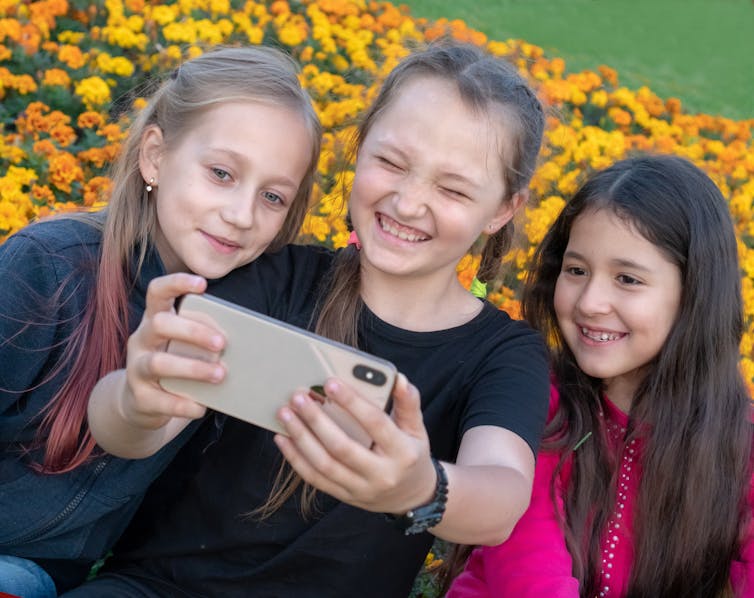The video-sharing app TikTok is a hot political potato amid concerns over who has access to users’ personal data.
The United States has moved to ban the app. Other countries, including Australia, have expressed concern.
But does this mean your children who use this app are at risk? If you’re a parent, let me explain the issues and give you a few tips to make sure your kids stay safe.
A record-breaker
Never has an app for young people been so popular. By April this year the TikTok app had been downloaded more than 2 billion times worldwide.
The app recently broke all records for the most downloaded app in a quarterly period, with 315 million downloads globally in the first three months of 2020.
Its popularity with young Aussies has sky-rocketed. Around 1.6 million Australians use the app, including about one in five people born since 2006. That’s an estimated 537,000 young Australians.
Like all social media apps, TikTok siphons data about its users such as email address, contacts, IP address and geolocation information.
TikTok was fined $US5.8 million (A$8 million) to settle US government claims it illegally collected personal information from children.
As a Chinese company, ByteDance, owns TikTok, US President Donald Trump and others are also worried about the app handing over this data to the Chinese state. TikTok denies it does this.
Read more: China could be using TikTok to spy on Australians, but banning it isn’t a simple fix
Just days ago the Trump administration signed an executive order to seek a ban on TikTok operating or interacting with US companies.
Youngsters still TikToking
There is no hint of this stopping our TikToking children. For them it’s business as usual, creating and uploading videos of themselves lip-syncing, singing, dancing or just talking.
The most recent trend on TikTok – Taylor Swift Love Story dance – has resulted in more than 1.5 million video uploads in around two weeks alone.
But the latest political issues with TikTok raise questions about whether children should be on this platform right now. More broadly, as we see copycat sites such as Instagram Reels launched, should children be using any social media platforms that focus on them sharing videos of themselves at all?
The pros and cons
The TikTok app has filled a genuine social need for this young age group. Social media sites can offer a sense of belonging to a group, such as a group focused on a particular interest, experience, social group or religion.
TikTok celebrates diversity and inclusivity. It can provide a place where young people can join together to support each other in their needs.
During the COVID-19 pandemic, TikTok has had huge numbers of videos with coronavirus-related hashtags such as #quarantine (65 billion views), #happyathome (19.5 billion views) and #safehands (5.4 billion views).
Some of these videos are funny, some include song and dance. The World Health Organisation even posted its own youth-oriented videos on TikTok to provide young people with reliable public health advice about COVID-19.
The key benefit is the platform became a place where young people joined together from all corners of the planet, to understand and take the stressful edge off the pandemic for themselves and others their age. Where else could they do that? The mental health benefits this offers can be important.
Let’s get creative
Another benefit lies in the creativity TikTok centres on. Passive use of technology, such as scrolling and checking social media with no purpose, can lead to addictive types of screen behaviours for young people.
Whereas planning and creating content, such as making their own videos, is meaningful use of technology and curbs addictive technology behaviours. In other words, if young people are going to use technology, using it creatively, purposefully and with meaning is the type of use we want to encourage.
Users of TikTok must be at least 13 years old, although it does have a limited app for under 13s.
Know the risks
Like all social media platforms, children are engaging in a space in which others can contact them. They may be engaging in adult concepts that they are not yet mature enough for, such as love gone wrong or suggestively twerking to songs.
Read more: The secret of TikTok's success? Humans are wired to love imitating dance moves
The platform moves very quickly, with a huge amount of videos, likes and comments uploaded every day. Taking it all in can lead to cognitive overload. This can be distracting for children and decrease focus on other aspects of their life including schoolwork.

So here are a few tips for keeping your child safe, as well as getting the most out of the creative/educational aspects of TikTok.
-
as with any social network, use privacy settings to limit how much information your child is sharing
-
if your child is creating a video, make sure it is reviewed before it’s uploaded to ensure it doesn’t include content that can be misconstrued or have negative implications
-
if a child younger than 13 wants to use the app, there’s a section for this younger age group that includes extra safety and privacy features
-
if you’re okay with your child creating videos for TikTok, then doing it together or helping them plan and film the video can be a great parent-child bonding activity
-
be aware of the collection of data by TikTok, encourage your child to be aware of it, and help them know what they are giving away and the implications for them.
Happy (safe) TikToking!
"follow" - Google News
August 17, 2020 at 03:12AM
https://ift.tt/2CCy8zu
TikTok can be good for your kids if you follow a few tips to stay safe - The Conversation AU
"follow" - Google News
https://ift.tt/35pbZ1k
https://ift.tt/35rGyU8
Bagikan Berita Ini















0 Response to "TikTok can be good for your kids if you follow a few tips to stay safe - The Conversation AU"
Post a Comment